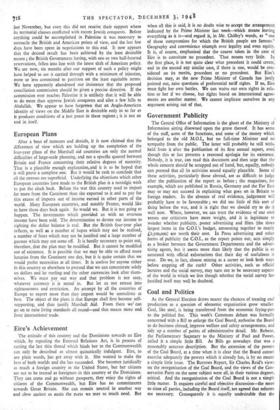Government Publicity
The Central Office of Information is the ghost of the Ministry of Information sitting disowned upon the grave thereof. It has some of the staff, some of the functions, and some of the money which belonged to the old M.O.I., but no full-time Minister and no sympathy from the public. The latter will probably be still with» held from it after the Publication of its first annual report, even' though this at last presents a reasoned apologia for its existence. Nobody, it is true, can read this document and then urge that the whole concern should be scrapped out of hand, but, equally, nobody can pretend that all its activities sound equally plausible. Some of these activities, particularly those abroad, arc as difficult to judge after the publication of the report as before ; the magazines, for example, which are published in Russia, Germany and the Far East may or may not succeed in explaining what goes on in Britain to foreign readers. In the absence of real evidence, judgement will probably have to be favourable ; we did too little of this sort ot thing before the war, and it is right that we should try to do it well now. Where, however, we can trust the evidence of our owr: senses our criticisms have more weight, and it is legitimate to wonder whether publicity, poster advertising and films (the three largest items in the C.O.I.'s budget, amounting together to nearly £2,5oo,000) are worth their cost. In Press advertising and other forms of publicity the C.O.I., as the report points out, acts simply as a broker between the Government Departments and the adver- tising agents, but it seems more than likely that the public is so saturated with official exhortations that their day of usefulness is over. Do we, in fact, choose mining as a career or look both ways before stepping off the curb? Other activities, such as official lectures and the social survey, may turn out to be necessary aspects of the world in which we live though whether the social survey has justified itself may well be doubted.


































 Previous page
Previous page